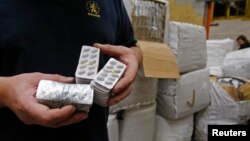JOHANNESBURG —
In most African countries, pharmaceutal drugs are poorly regulated or not regulated at all, posing huge risks for those who depend on them to stay healthy. But for the first time, the topic has gotten the attention of African officials, who holding a scientific conference on the topic in South Africa.
Access to safe and effective medicine can be touch and go in Africa, where the market abounds with drugs that are fake or expired.
That can have disastrous consequences, says Margareth Ndomondo-Sigonda, a Tanzanian who oversees pharmaceutical issues for an African Union agency, the New Partnership for Africa's Development, or NEPAD.
"The situation that you see in Africa is that most of the medicines circulating in our market, more than 30 percent, either does not meet the standards, meaning that it cannot treat the disease that it is intended to, or it is falsified, meaning that it is not a real medicine," Ndomondo-Sigonda said. "Could be that it does not have the necessary active ingredients, and therefore it may not treat or it may even cause harm to the patient instead of actually treating the disease that is intended."
She is one of hundreds of experts who gathered in Johannesburg this week for the first-ever scientific conference bringing together pharmacists, health workers, governments and civic organizations to discuss how to better regulate the drugs that make it to health facilities across Africa.
Ndomondo-Sigonda says that most African nations lack the capacity to effectively police medicines. Nations are considering tightening and refining their testing protocols and collaborating on testing, among other interventions.
Experts also noted the role that law enforcement authorities can play in cracking down on fake drugs. While this is sure to be a long and costly process, NEPAD's head science advisor Aggrey Ambali says these measures may end up making drugs cheaper for consumers.
If countries cooperate to test drugs, he says, they can save money. And if local drug producers are made aware of the new guidelines, they can compete more effectively.
"Without actually having the actual numbers, but the pointers are there that if this were to succeed, I think there are opportunities of trying to find ways of cutting costs which can actually be reflected in the final price of the medicine," said Ambali.
Ndomondo-Sigonda says consumers can protect themselves now by being selective about where they buy their drugs and sticking to trustworthy health facilities.
"The minute they go and buy medicines in the open markets, that is where the problem starts, because the products in the open markets, they are not assured because you do not know where they source them from and you have a huge potential for buying counterfeit medicines in such markets," she said.
That fact was illustrated in 2011, when the World Health Organization reported that in Nigeria, the continent's largest pharmaceutical market, nearly two-thirds of drugs used to fight malaria were fake.
Access to safe and effective medicine can be touch and go in Africa, where the market abounds with drugs that are fake or expired.
That can have disastrous consequences, says Margareth Ndomondo-Sigonda, a Tanzanian who oversees pharmaceutical issues for an African Union agency, the New Partnership for Africa's Development, or NEPAD.
"The situation that you see in Africa is that most of the medicines circulating in our market, more than 30 percent, either does not meet the standards, meaning that it cannot treat the disease that it is intended to, or it is falsified, meaning that it is not a real medicine," Ndomondo-Sigonda said. "Could be that it does not have the necessary active ingredients, and therefore it may not treat or it may even cause harm to the patient instead of actually treating the disease that is intended."
She is one of hundreds of experts who gathered in Johannesburg this week for the first-ever scientific conference bringing together pharmacists, health workers, governments and civic organizations to discuss how to better regulate the drugs that make it to health facilities across Africa.
Ndomondo-Sigonda says that most African nations lack the capacity to effectively police medicines. Nations are considering tightening and refining their testing protocols and collaborating on testing, among other interventions.
Experts also noted the role that law enforcement authorities can play in cracking down on fake drugs. While this is sure to be a long and costly process, NEPAD's head science advisor Aggrey Ambali says these measures may end up making drugs cheaper for consumers.
If countries cooperate to test drugs, he says, they can save money. And if local drug producers are made aware of the new guidelines, they can compete more effectively.
"Without actually having the actual numbers, but the pointers are there that if this were to succeed, I think there are opportunities of trying to find ways of cutting costs which can actually be reflected in the final price of the medicine," said Ambali.
Ndomondo-Sigonda says consumers can protect themselves now by being selective about where they buy their drugs and sticking to trustworthy health facilities.
"The minute they go and buy medicines in the open markets, that is where the problem starts, because the products in the open markets, they are not assured because you do not know where they source them from and you have a huge potential for buying counterfeit medicines in such markets," she said.
That fact was illustrated in 2011, when the World Health Organization reported that in Nigeria, the continent's largest pharmaceutical market, nearly two-thirds of drugs used to fight malaria were fake.








